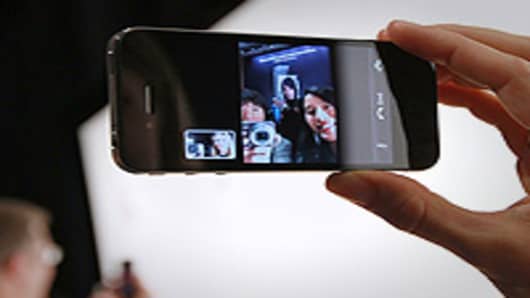Apple stock is trading lower after iPad and iPod numbers came in lower than Wall Street's sky-high expectations, but it turns out there are more important truths to glean from Apple's conference call. (Track Apple Here)
The biggest: Apple's iPhone 4 is a blockbuster. The company sold 14.1 million units in the September quarter, more than even the most optimistic analyst estimates, and executives said they still weren't able to keep up with demand. Component shortages are to blame; operations chief Tim Cook said he still doesn't know when Apple will have enough iPhone 4s, which suggests there might be more shortages for the big holiday quarter.
Here's the thing about the iPhone: It's now Apple's most important product, so its results matter more than anything else. Apple's ability to ramp up its iPhone supply chain matters far more than a missed iPad or iPod number.
Apple CEO Steve Jobs , in a rare appearance on the call, brought a strong defense of Apple's iPhone strategy against new challenges from Research in Motion and Google . His most memorable points:
1. RIM isn't good at software. The BlackBerry maker is trying to position itself as a platform for app makers, but Jobs pointed out that it's a tough transition for the messaging provider.
2. Google's Android OS is fragmented. Jobs argues that there are so many different versions of Android floating around with so many different screen sizes and specs, that developers will have a hard time making progress on the platform.
3. "Open" doesn't always win. Apple gets a lot of flack for the way it controls the hardware, software and app store on its iOS devices. Folks tend to say Apple vs. Google today is like Apple vs. Microsoft in the PC wars a couple of decades ago, where Microsoft clobbered Apple with its more open model. Jobs says that's a smokescreen.
Here's my take on a couple of those points.
On the BlackBerry, Jobs is right. RIM's got its work cut out, and needs to quickly produce high-quality, desirable phones running its new BlackBerry 6 OS. RIM is clearly torn between supporting the legacy software and messaging platform that its core enterprise customers use, and quickly bringing out a new, more modern platform. Apple's approach in situations like this has been to move quickly; the transition to OS X a decade ago was quite deliberate, and the move from Power PC to Intel processors a few years later was decisive. We'll see how RIM does.
On Android fragmentation, I think Jobs is making too much of the point. He's right, of course, that Android is fragmented. But the huge majority of the best Android phones so far are coming from HTC, Motorola and Samsung, with a few other names filling in behind. If developers target the top Android handset makers, who are actually quite disciplined, fragmentation is less of an issue.
Questions? Comments? TechCheck@cnbc.com And you can follow Jon Fortt on Twitter @jonfortt



